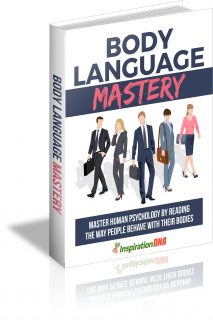 License Type: Master Resell Rights
License Type: Master Resell Rights  File Type: ZIP
File Type: ZIP
 SKU: 61278
SKU: 61278  Shipping: Online Download
Shipping: Online Download
Sample Content Preview
Foreword
Body language is another form of subtle communication often practiced consciously or unconsciously. This “language” is fast gaining the interest of many people. Body language though very relevant but can sometimes be wrongly interpreted, however it is still useful.
Body Language Mastery
Master Human Psychology By Reading The Way People Behave With Their Bodies
Chapter 1:
Introduction To Body Language
There are many form of communication and sometimes a person’s body language can actually indicate more things than the spoken word. Learning to understand body language can be very beneficial both in the work environment as well as on a more personal front. Body language reveals personal feelings and reactions to other people’s feelings. However is has yet to be proven to be a science form and is not a real indicator to anything as it can be and is often manipulated.
The Basics
Most powerful people use this form of the unspoken word to make judgment calls which have proven to be a very effective way of getting and giving information. Some quarters qualify any and all movements in the body to be categorized as body movement; while others go even further to say that even breathing techniques fall in this category too.
When meeting someone for the first time, it is often a benefit to be able to read their body language signals to assess either the person or situation.
However again it may not be the best way to form an opinion because as mentioned earlier, body language can be manipulated. The art of body language is constantly being exchanged and interpreted between people on different levels of alternative communication.
While an individual is busy reading the body language of those he or she in interacting with, they at the same time are also reading the individual’s body language. People who make it a habit of reading body language sign always have the advantage over any situation the thus having some knowledge on this subject would be good.
Chapter 2:
Understand The Positive And Negative Positions
In order to be able to read the various body language signals fairly accurately, one must first have a basic knowledge of all the possible positions and meanings attached and projected by these various poses.
The Put Offs
When a person’s demeanor personifies confidence the body language projected would be a brisk and erect walk. This movement successfully conveys the image and mind set of someone focused and sure of themselves.
The classic stance of hand on hips and legs slightly apart typical of people trying to portray authority actually reads as being ready for any outside reaction and potential aggression tendencies. It can also be used as an intimidating tool.
Sitting with legs slightly apart for men signals confidence and a very relaxed demeanor. This body language interpretation also applies to sitting with hands clasped behind the head and legs crossed or stretched out.
The open palm position shows sincerity, openness, and innocence, as does an easy slight smile or slight upturned corners of the mouth.
When it comes to the negative body language signs, unfortunately there are a lot to choose from and fairly easy to see and interpret. For instance, sitting with legs crossed and foot kicking slightly clearly signifies boredom while the arms crossed at the chest tells of an individual’s defensiveness.
Walking with hands in pockets and shoulders hunched slightly, is a clear indication of dejection. Touching or slightly rubbing of the nose area is most commonly seen as rejection, doubt or lying. Rubbing the eye which is unwise to say the least could simply signify tiredness or feeling sleepy or have a more in depth sign of doubt and disbelief.
Anger and frustration are usually shown as clasped hands behind the back and a stiff spine position. Sometimes apprehension is also portrayed this way.








